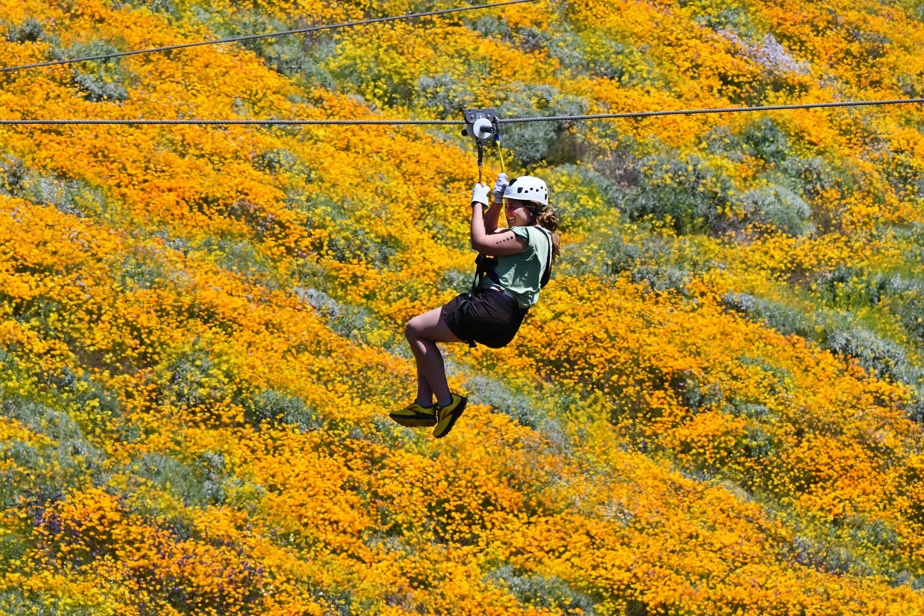(Corona) Suspended in her harness 50 meters above the ground, Triana Montserrat zips down a zipline over a vibrant bed of wildflowers: orange, yellow, purple, white… the mountains of Corona’s Skull Canyon, in the back -country of Los Angeles, amaze him.
“It almost looks like a painting, with all these different colors,” breathes the 29-year-old, blown away by the intensity of “Super Bloom”, an exceptional bloom that is currently affecting California after several springs of absence.
“It’s so intricate and beautiful,” she raves, flying over the patterns carved along the slopes by California poppies, encelia farinosa, and lupines. “My mind couldn’t have imagined that on its own. »
The US West Coast hadn’t seen a “superbloom” since 2019.
Rare, this phenomenon occurs only when heavy rains occur after several years of drought. The arid land, cleared of the weeds usually so quick to absorb the available nutrients, then gave birth to wild flowers by the thousands, whose sprouts struggled to find a place.
The particularly harsh winter that hit California, with its series of storms and near-record rainfall, allowed this year to achieve this delicate alchemy.
As a result, the Californian hills and some of its deserts are covered with an ocean of colors visible from space.
But the return of this impressionistic nature, which has long fascinated Spanish missionaries and great pens of American literature, resonates differently in a world dominated by Instagram and TikTok.
Three kilometers from the slopes where Triana hovers, a hiking trail is closed to the public because of overtourism: the nearby town of Lake Elsinore bars access to Walker Canyon with gates, monitored by a patrol car.
The authorities refuse to relive the “apocalypse” of 2019. Tens of thousands of visitors then invaded this path and created monster traffic jams paralyzing the region. Worthy of Disneyland, the crowd of influencers and tourists obsessed with selfies did not hesitate to park on the side of the highway, to get their shot in the middle of the wildflowers.
“It was a nightmare, […] they trampled everything and crushed a lot of the flowers,” Pete Liston, the owner of the Skull Canyon zip line, told AFP. Four years later, “nothing has grown back” in the lawless traces left by the vandals.
Faced with the closure of the public trail, its adventure park is seeing its clientele increase this spring. Many nature lovers use his zip line to admire the 2023 “Super Bloom” vintage, without damaging the environment.
A hiking enthusiast, Triana wanted to be in the front row while minimizing her impact on the reproduction of flowers.
“I wanted to make sure future generations could enjoy it,” says the cook, who approves of closing the nearby canyon as a “necessary” measure.
As an alternative, the City of Lake Elsinore offers visitors the opportunity to observe the flowers of Walker Canyon on its website, thanks to a live camera. An intransigence far from unanimous, even among the defenders of the flora.
Each “Super Bloom” is a “moment of awareness that allows the public to connect with nature and generate enthusiasm for biodiversity,” says Evan Meyer, director of Theodore Payne Foundation, an organization that tries to distribute the crowds with a toll-free number informing about the latest blooms. “By closing Walker Canyon, Lake Elsinore sends the exact opposite message. »
More worried about real estate development in the hills of the region than the irresponsibility of a minority of Instagrammers, this specialist calls for “developing an ethic to appreciate nature”.
An effort supported by the Skull Canyon guides. Between two lengths of zip line, they remind visitors that it is forbidden to pick the California poppy, whose bright orange inspired the nickname “Golden State”. Just like other wildflowers.
Photo enthusiasts like Lisa Mayer are however welcome. After missing out on 2019’s “Super Bloom,” this Los Angeles shopkeeper is blasting the mountains from every angle with her smartphone.
The pictures will end up on Instagram, recognizes the forties. But she will accompany them with captions reminding us to “protect the flowers, do not crush them and be careful where you walk.” »

